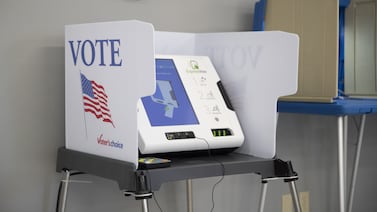Votebeat is a nonprofit news organization reporting on voting access and election administration across the U.S. A version of this post was originally distributed in Votebeat’s weekly newsletter. Sign up for our free newsletters here.
Hi, y’all,
For the last few years, election administrators have been playing whack-a-mole with conspiracy theories: Give in to some so that you can get something (anything) done, and hope that more don’t fill the hole you’ve left.
Unfortunately, they always do.
So, I hope you’re ready for this wild ride of an example: We’re about to talk about paper thickness.
Remember Sharpiegate? Our Arizona reporter, Jen Fifield, has in many ways never stopped reporting on it.
What do I mean by that? Well, in 2020 Maricopa County had voters start using Sharpies, which dry very quickly, to fill out ballots. Handy! By happenstance, during that election they also used 80-pound instead of 100-pound ballot paper due to the supply chain crisis that swept the country during the pandemic. The pairing of the lighter-weight paper and the Sharpies meant markings bled through on lots of ballots.
Even though the selection bubbles on the ballots are offset from front to back, which means even the darkest bleed through would not have mattered for counting, conspiracy theorists screamed that their ballots were intentionally being invalidated. And, so, to appease those concerned about “Sharpiegate,” Maricopa County switched back to the 100-pound paper for 2022.
Totally unnecessary, sure, but what’s the harm?
Let me tell you.
“The combined effect of the heavy paper, longer ballot, and intermittent burst of print demand pushed the printers to perform at the very edge of or past their capability,” retired Arizona Supreme Court Justice Ruth McGregor, hired by Maricopa County to conduct a review of the issue, wrote in her report issued this week. The resulting printed ballots were slightly misprinted, one factor making it difficult for them to be read by the polling-place-based scanners. Chaos ensued. Kari Lake has made bizarre allegations.
If that sounds familiar, it’s because Jen reported basically the gist of what happened back in December.
In short, Maricopa County chose to solve what was essentially a fake problem, and, in so doing, caused a very real one. It is a story structure well known in the business of election reporting, because elections are complicated systems and changing something can create unintended consequences.
Consider, for example, the law in Texas aimed at assuaging conspiracists’ belief that election workers were changing the vote tallies. The law (inadvertently) demanded counties purchase imaginary machines. Legislation has now been introduced to fix a problem caused by the previous attempt at a solution.
In Maricopa, its problematic ballot printers had not been used for that purpose at that volume with that paper prior to that election, making it apparently impossible to know how dramatically a seemingly minor choice might affect the overall voting process. In Texas, the vote for imaginary machines passed by voice and without pushback because the language seemed so uncontroversial.
The tricky thing about elections is that they are built on a poorly balanced structure of old machines, nonsensical laws, and cynical politicians, and held together by creative and committed bureaucrats who are not paid nearly enough money to do this work. This is a particularly daunting set up when you consider that something as small as changing the weight of paper election-over-election might send the whole thing spinning for months on end.
We’ll keep showing up to cover these meltdowns. Can you see one coming where you are? Tell us about it.
Back Then
Elections are, as stated above, a crazy mishmash of things added together to achieve a simple end. They are the bureaucratic Rube Goldberg machine. And in 2004, the team representing Purdue University’s Society of Manufacturing Engineers won the right to represent their university in a national Rube Goldberg competition after winning an election-themed preliminary contest. Contestants were to “create machines that would cast a ballot in a minimum of 20 steps using principles of engineering and physics.”
The winning team’s machine was hanging chad-themed, and used more than three times the required number of steps “to complete the task of selecting, marking and casting a paper ballot” by punching a hole through a selection, leaving a flap.
“We didn’t plan on having that many steps,” Andrew Nymeyer, a senior in the School of Technology and co-chair of the winning team told Purdue News. “A week ago, we only had about 30, but every time something didn’t work, we had to add a couple more to fix the problem. It got a little out of hand.”
Election administrators feel your pain, Andrew.
New From Votebeat
From Votebeat: These state officials praised ERIC for years before suddenly pulling out of the program
From Votebeat Arizona: “Past their capacity”: Independent review reveals why Maricopa County ballot printers failed on Election Day
From Votebeat Texas: Texas legislators pursue fix to costly law that requires nonexistent election equipment
Votebeat on the Air
You can hear Votebeat story editor Carrie Levine share her expert analysis and context on urgent issues in elections on the public radio show 1A last week. She was joined by UCLA law professor Rick Hasen and former Alabama Secretary of State John Merrill to talk about ERIC, harassment of election officials, records requests, and election funding shortage on the episode “Remaking America: Safeguarding free and fair elections ahead of 2024.”
In Other Voting News
- Less than a week after Tennessee state lawmakers, in a widely criticized move, expelled two Black members who led protests for gun control onto the state House floor, local officials returned both to the state Legislature ahead of special elections later this year in which both are expected to run, the New York Times reported.
- Proponents of baseless conspiracy theories about voter fraud took over an elections board in Buckingham County, Virginia, eventually prompting the county’s entire elections staff to quit, NBC News reported. Similar situations are playing out around the country, including in this Votebeat story from last year about Gillespie County, Texas.
- An Arizona lawmaker knew guests she invited to speak at an election committee hearing would accuse elected officials of participating in a cartel “bribery” scheme and “took steps” to hide the information from the state Legislature before the presentation, a new report by the Ethics Committee found, the Arizona Republic reported. State Rep. Liz Harris, a Republican, is potentially subject to a range of punishments that could be determined by the state House of Representatives.
- Louisiana Secretary of State Kyle Ardoin, a Republican, said he won’t run for reelection and said he hopes “Louisianans of all political persuasions will stand against the pervasive lies that have eroded trust in our elections by using conspiracies so far-fetched that they belong in a work of fiction,” reported nola.com.
- Pennsylvania’s 2024 presidential primary is scheduled for the first day of Passover, potentially disenfranchising observant Jews who wouldn’t be able to participate and prompting some lawmakers to ask state officials to move up the date, the Philadelphia Inquirer reported.
- A man was convicted of a felony for threatening Colorado Secretary of State Jena Griswold after he called her office and told employees to “tell the secretary that the angel of death is coming for her in the name of Jesus Christ” and authorities tracked his cell phone and found him driving towards Colorado, the Colorado Sun reported. This is the second time someone has been found guilty of charges related to threatening Griswold.
Jessica Huseman is Votebeat’s editorial director and is based in Dallas. Contact Jessica at jhuseman@votebeat.org.






